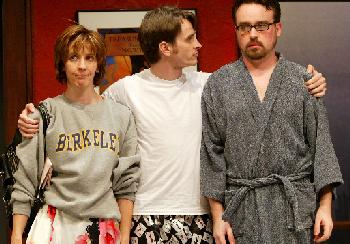SEARCH CurtainUp
REVIEWS
FEATURES
NEWS
Etcetera and
Short Term Listings
LISTINGS
Broadway
Off-Broadway
BOOKS and CDs
OTHER PLACES
Berkshires
London
LA/San Diego
Philadelphia
Elsewhere
QUOTES
On TKTS
LETTERS TO EDITOR
FILM
LINKS
MISCELLANEOUS
Free Updates
Masthead
NYC Weather
 Review
Review
Fallen from Proust
by Sam Thielman
|
The only way to treat something deadly serious is to make a little light of it. ---Madeline L'Engle |
 H. Lambert, D. Boggess and M. Glenn (Photo: Carol Pratt)
|
Norman Allen's Fallen from Proust raises what seems like a simple question: is he or isn't he? Everyone wants to know, especially crass, insecure, and magnetic manipulator Gary. As he tries to inveigle firmer indications of his new roommate Roger's sexuality, he begins to hold forth on the overuse of the word "sexy."
"All PR people talk about is sexy this, sexy that," Gary scoffs, accidentally sipping Roger's beer. "I had lunch with the head of our corporate donation office, and all the woman talked was sex. Giving money to the homeless is not sexy. Giving money to education is sexy, but only if you have pictures of it." He pauses significantly. "What about you?" he asks. "What do you find sexy?"
Roger gives the matter a little thought. "Are the choices homeless people and education?"
This is Fallen from Proust at its very best; glib, charming, and completely without a comedic conscience -- from slapstick to celebrity impersonation (Gary does both Sonny and Cher while lip-synching "I Got You, Babe"),director Will Pomerantz takes the "kitchen sink" approach to humor and throws in every gag in the book, masking the tensions of two characters with fragile sexual identities.
The setup sounds like a perfect setting for a tired middlebrow comedy: gay male roommate, straight male roommate, girlfriend, we'll wake you later. But wait, before you nod off, Allen has to ask you a couple of questions. First, do you mind if a gay man falls in love with a straight woman in his play? If so, why? One more, and then you can get some rest -- is marriage and family worth the sacrifice of a person's sexuality? Oh, and is political conservatism a valid lifestyle choice for a gay man?
Allen first presents Roger as gay, conservative, pro-life, single, and potentially straight for the right woman -- in a word, unpopular. Gary, by contrast, is rich, crude, and self-absorbed. Nobody likes him, either. Of course, it's hard to scoff at Roger when he's so pathetically alone (because, well, no one likes him), and Gary goes from loathsome to pitiable when he finds himself losing Michelle (more of a McGuffin than a character, mostly in spite of Hope Lambert's valiant efforts to give her texture), not to her indiscretions, but to his own.
Allen's perky script and hyper-trendy characters keep his big questions grounded in familiar territory, and its immediacy keeps it from ascending to the heights of pretension suggested by the title, or falling into the simplicity suggested by the setup. This is a timely piece, as well -- almost too timely; the blue state/red state jokes prod at a wound that hasn't quite healed. Fallen from Proust a rare beast: a romantic comedy with an edge in its voice. It weakens in the second half; Allen excuses all three of his characters from the tough decisions he lays out for them in the first act, but it's hard to begrudge him his happy ending when the characters seem so destined for failure from the beginning. Like a cheerful Noel Coward farce gone horribly wrong, Fallen from Proust deals with the modern polyhedral mechanics of three people variously in love with each other. No longer a love triangle, Gary, Roger, and Michelle form something with more angles and connections -- something three-dimensional, perhaps.
The dynamic falters with Michelle, a character culled from any number of Meg Ryan movies. Bouncing between Gary and Roger, she scarcely registers. The problem is not that Allen has given her too little to do, but that he hasn't given her anything to hide. Both Gary and Roger have large, threatening secret lives that change the course of their relationships with each other and Michelle. It's a pity she can't (as they say in poker) see their flaws and raise; her relationship with prostitute (and generic "surprise!" character) Alan (a refreshingly butch Daniel Frith) seems forced.
Fallen from Proust makes its points quickly and well; its flaws are amended by the lightheartedness of the dialogue and the general good nature of the acting and direction. The lack of seriousness belies Allen's greatest asset, and one that too many playwrights find themselves wanting: he has something to say.
|
Fallen from Proust by Norman Allen Directed by Will Pomerantz with Damon Boggess, Daniel Firth, Michael Glenn, and Hope Lambert Set Design by James Kronzer Lighting Design by Jason H. Thompson Costume Design by Jenn Miller Sound Design by Brendon Vierra Running Time: 1 hour, 45 minutes with a fifteen-minute intermission Signature Theatre, 3806 S. Four Mile Run Dr., Arlington Telephone: 703.218.6500 TUES - WED @7:30, THURS - SAT @8, SUN @2 and 7; $32-39 Opening 1/11/05; Closing 2/20/05 Reviewed by Sam Thielman on Jan. 16 |

Easy-on-the budget super gift for yourself and your musical loving friends. Tons of gorgeous pictures.

Retold by Tina Packer of Shakespeare & Co.
Click image to buy.
Our Review

At This Theater

Leonard Maltin's 2005 Movie Guide

Ridiculous!The Theatrical Life & Times of Charles Ludlam

6, 500 Comparative Phrases including 800 Shakespearean Metaphors by CurtainUp's editor.
Click image to buy.
Go here for details and larger image.



